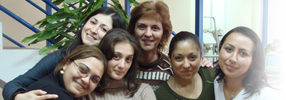|
1. AIMS AND OBJECTIVES OF THE FELLOWSHIP
The objectives of the project are to provide a monitoring framework on how the
Decade of Roma Inclusion addresses the social exclusion of Romani women in
Montenegro, Croatia and Serbia in the areas of education, employment, housing
and health care; The policy study and the research paper which will result from
the research, in coordination with the group advisor, will also be put at the
disposal to the OSI Roma Initiatives Office, the Network Women’s Program, the
national Soros foundations in Montenegro, Croatia and Serbia and the Roma-related governmental offices in Montenegro, Croatia and Serbia.
2. PARTNERSHIPS WITH OSI NETWORK PROGRAMS AND
FOUNDATIONS
In the framework of this research project, it would be very useful to establish
cooperation and information exchange with the following:
(1) Open Society Institute (OSI) Initiatives:
- Women’s Program, particularly the Roma Women’s Initiatives, but also
hopefully the “mainstream” gender initiatives such as the projects on Women’s
Reproductive Rights and Health, Gender and Education, Information and
Documentation network, etc.
- Roma Initiatives Office, particularly the Roma Participation Project (RPP), Roma
Education Initiative, and the Public Health project initiatives relevant to Roma
and/or Romani women.
- European Union Monitoring and Advocacy Program (EUMAP), who had
previously shown expressed interest in publishing articles on gender and the
Roma Decade, and additionally with regards to their ongoing “Equal Access to
Quality Education for Roma” project, as it is implemented in all the countries of
the research.
(2) Soros Foundations network:
- Fund for an Open Society Serbia
- Open Society Institute Croatia
- Foundation Open Society Institute, Representative Office Montenegro
All three national Soros foundations in the countries of the research have been
extensively engaged in Roma- and Romani women-related projects and initiatives.
(3) Possible external institutions receiving considerable OSI funding:
- Roma Education Fund (REF), with regards to their support to Roma educational
projects in the research countries in the context of the Roma Decade;
- European Roma Rights Center (ERRC), with regards to their research in the
project countries and their women’s rights projects.
3. EXPECTED BENEFITS
It is hoped that possible cooperation with the abovementioned institutions and
projects would not only be beneficial for the researcher, in terms of information
sharing in desk research and field work, but that the research results and policy
recommendations would be beneficial for the outlined programs and projects, by
the means of information sharing, pursuing possible streamlining where possible,
etc, and would hopefully also result in future joint projects and initiatives.
4. THE PROJECT’S MAIN DELIVERABLES
The main deliverables of the project will be, at a minimum:
- Issue paper (2-3 pages), finalized in June 2006.
- Policy study (20 pages - 10,000 words), finalized in February 2007.
- Advocacy event, organized with the NGO Women’s Studies and Research in
Novi Sad, Serbia, on the rights of Romani women, to take place in April 2007 on
the occasion of the International Roma Day. The event would be used as an
opportunity for the Fellow to present the research results and the policy paper; it
would be attended by 20 participants from Serbia and guest speakers from
Croatia and Montenegro.
- Research paper (20-40,000 words), finalized in May 2007.
- Publication on Romani women’s rights in the Decade of Roma Inclusion (up to
100 pages), published in Serbia, and finalized in summer 2007.
- The Fellow’s personal website, which would contain information and
photographs from the field research, as well as links to articles, projects and
organizations dealing with Romani women and/or the Decade of Roma Inclusion,
both in the countries of the project and generally, and would hoperesource for activists, academics, researchers, policy makers, etc.
|

